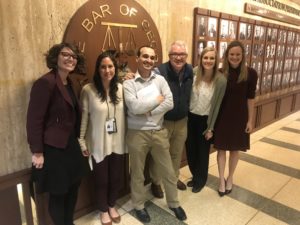When I succeed in my brief writing or at oral argument (I measure success by writing a good brief and by fluid conversational delivery at argument — not necessarily by result), it is because I stop to think about my audience. More particularly, I remember that my audience includes a set of staff attorneys and judges or justices with a stack of briefs to read that hopefully don’t look exactly like mine.
An article in today’s legalnewsline.com reminded me of the fact that the people who hear my argument and who read the briefs that I write are people with interests beyond my particular cases. They even have interests beyond the law.
According to the article, Justice Robert Benham of the Georgia Supreme Court “has his own woodworking shop, [where he makes] objects like toys and music boxes with his two sons.” He also “builds birdhouses for Habitat for Humanity.”
Those facts humanize him and tell me more than his official biography does. Official biographies, like resumes, start looking the same after a while. But to know that someone makes toys, music boxes, and birdhouses for Habitat tells me that one member of the audience is compassionate. It also tells me that workmanship and craft are important to him. I should be very precise and concise in the future.
Justice Antonin Scalia and Bryan Garner make it a point to tell lawyer how important it is to know about your judge before you present your brief, try your case or show up for oral argument. In their book, Making Your Case: The Art of Persuading Judges. Scalia and Garner advise:
“learn as much as you readily can about the judge’s background. Say you’re appearing before Judge Florence Kubitzky. With a little computer research and asking around, you discover that fly-fishing is her passion; that her father died when she was only seven; that her paternal grandparents, who were both professors at a local college, took charge of her upbringing; that she once chaired the state Democratic party; that she enjoys bridge … and so on. … you might well find some unpredictable use for this knowledge over the course of a lengthy trial.”
Most importantly, they add, “at the very least, these details will humanize the judge for you, so you will be arguing to a human being instead of a chair.”
Keeping in mind that your audience consists of people and not a judicial machine will help you write better briefs that help them decide the case. If yours is the 53rd brief in a stack of 100 that looks exactly like the others, then your judge might get bored, might skim your text, or might just affirm the conviction because that is a nice safe default.
Of course, not all judicial hobbies are good. I suppose that when you find bad hobbies, you have a nice new enumeration of error to raise for your client and and the opportunity for a new judge with a healthy life and more wholesome hobbies.



